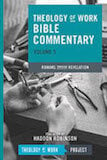Monday Morning Faith: Going to Work for God (Sermon Notes)
Sermon Notes / Produced by The High Calling
Slaves, obey your earthly masters in everything, not only while being watched and in order to please them, but wholeheartedly, fearing the Lord. Whatever your task, put yourselves into it, as done for the Lord and not for your masters, since you know that from the Lord you will receive the inheritance as your reward; you serve the Lord Christ. For the wrongdoer will be paid back for whatever wrong has been done, and there is no partiality. Masters, treat your slaves justly and fairly, for you know that you also have a Master in heaven. Devote yourselves to prayer, keeping alert in it with thanksgiving. At the same time pray for us as well that God will open to us a door for the word, that we may declare the mystery of Christ, for which I am in prison, so that I may reveal it clearly, as I should. Conduct yourselves wisely toward outsiders, making the most of the time. Let your speech always be gracious, seasoned with salt, so that you may know how you ought to answer everyone. (Colossians 3:22-4:6)
The Big Idea: All work is God’s work and should be done for the same reasons we go to church: to worship and glorify God and serve our fellow man.
Introduction: When the last hymn has been sung and the benediction pronounced, you walk out the door into the rest of your life. Does the hour you spend here on Sunday mornings have any relevance to the other 100-plus waking hours of your week? Sadly, many Christians don’t see the connection between Sunday worship and Monday work. In fact, some Christians agree with non-Christians who believe that faith and work don’t mix. Maybe this even describes you.
[As a theologian, I think it’s important that we own up to our contribution to this confusion, so I usually tell a story about how I came to understand the huge mistake I was making about faith and work. You could tell a similar story from your own experience about how your perspective on the topic changed. I had just invested four years of my life and accumulated 120 graduate hours of theology to earn a master’s degree in order to enter vocational ministry so I could play a significant role in God’s kingdom. I’ll never forget sitting across the table from an attorney and elder of the church that had just hired this would-be hero fresh from theological studies. In our conversation over lunch, he looked me square in the eyes and said, “Bill, you know that God’s heroes don’t stand behind pulpits, don’t you?” I’m not sure I heard anything else he said after that. I was stunned! The problem was, he was right.]
I’m not sure how I missed this critical point. After all, most of the heroes of the Bible are workplace followers of God, not religious professionals. Just think about it: In the opening chapters of Genesis, we see God both at work himself and also putting Adam to work.
Then there’s Jesus. He spent ninety percent of his life growing up and working in a small business, compared to only three and a half years in his ministry. Even after he laid aside his hammer and chisel, 45 of the 52 parables he told take place in a workplace setting. This makes sense because he lived in a Jewish culture which believed in a God who worked and saw every kind of work that mankind did as an extension of his work.
In Colossians 3:23 Paul tells us, “Whatever you do, work at it with all your heart, as working for the Lord, not for men.” Abraham Kuyper, Dutch prime minister at the turn of the twentieth century, said, “There is not one square inch of the entire creation about which Jesus Christ does not cry out, ‘This is mine. It belongs to me.’” If this is true, then faith not only can mix with work, it must mix with work.
I. What does faith look like on Monday? So, what does faith on Monday morning look like? In Colossians 3 and 4, Paul paints a sharp contrast to work habits and priorities we’ve learned from the world. In Colossae and other cities where Paul ministered, the bulk of business was transacted in households, usually by masters and their slaves, and it is in this context that Paul addresses the workplace of his day. [Read Colossians 3:22-4:6.]
After describing how our new life in Christ should affect our personal life and our family life (Col. 1:1-3:21), Paul explains three ways our faith should influence our work. It should give us a new attitude, a new power source, and a new career objective. This morning, we’re going to look at what a new attitude encompasses, and the following two Sundays we’ll examine our new power source and career objective.
Here’s a question: Have you ever wondered if what you’re doing with your life is really worthwhile? Have you wanted to do something significant for God—to make your life really count? If so, Paul would say, “Don’t change jobs; change your attitude.” Let’s consider three critical attitude adjustments that will transform our work.
A. First is an attitude of service. The world says you must have power. But note the contrast: God says we go to work not to get others to serve us, but to serve them. Not to gain power but to empower. And that goes for everyone, no matter where you find yourself on the corporate food chain. According to Paul, whether we are giving or taking orders, we are to take the lead in seeking the welfare and success of others. Whether I am an employee or an employer, Paul says I go to work not primarily for myself, but for others. I am to treat the people I work for fairly, giving to them the work they expect of me. As for those who work for me, I am to empower them fairly to do their work. [Add an illustration of someone you have noticed working with a servant’s attitude, perhaps going above and beyond expectation.]
[Application to consider: If you are between jobs, you might be tempted to consider salary, benefits, or just any work that pays money. As a follower of Christ, you need to be asking not only how much a job pays, but also how will you be able to serve.]
[Comment to consider at a point you deem appropriate: If you want to know if you have the attitude of a servant, think about how you respond when someone treats you like one.]
B. Second, we are to do our work with an attitude of worship. The world says you must have prestige. You have to make a name for yourself. But note the contrast: God says we go to work not to make a name for ourselves, but to make a name for God.mPaul makes it clear that at its core, work is a means of worship—a way we ascribe worth to God. “It is the Lord Christ you are serving,” so we do our work “with sincerity of heart and reverence for the Lord.”
Don’t miss how scandalous these words must have sounded to the Greeks who believed that any kind of labor was demeaning. Paul says whatever you do can be and should be done for the Lord. It is hard to escape the fact that Paul sees all work as meaningful and God-honoring. Consider that he is addressing slaves, some of whom did the most menial kinds of labor. To them, Paul’s words would have been revolutionary because whatever includes a wide variety of unpleasant activities.
Paul’s words obliterate the idea that God’s work and one’s daily work are separate categories. All work is God’s work. If you are meeting legitimate human needs, then you are working for God. Work is what we were created to do, and when we do it well as an act of love and worship “as unto the Lord,” our work glorifies the God we serve. That, of course, means that we do quality work, and put our whole heart into it, because this is what God deserves.
C. The third outlook Paul wants us to have about our work is an attitude of expectation. The world says you must have possessions. It’s all about the money! But note the contrast: God says we go to work not primarily to make a living, but to earn an eternal reward. Think about it: Your daily work—as a teacher, banker, plumber, doctor—counts for eternity. This passage clearly teaches that God will hold us accountable as stewards for what we do in our daily work.
As we all know, profit is a strong motivation and can be a dangerous driver if not pursued in the way God intended. It’s important to know that far from attacking our desire to profit from our work (since that’s the way God made us), the Bible redirects us to remember the ultimate reward for good labor—to stand before God and hear, “Well done, good and faithful servant.” In his insightful essay, “Weight of Glory,” C. S. Lewis suggests that God finds our desire for profit too small, not too large. “We are,” as he says, “far too easily pleased” with worldly things, when what we really want is waiting for us before God.
It is written that we shall “stand before” him, shall appear, and shall be inspected. The promise of glory is the promise, almost incredible and only possible by the work of Christ, that some of us, that any of us who really chooses, shall actually survive that examination, shall find approval, shall please God. To please God . . . to be a real ingredient in the divine happiness . . . to be loved by God, not merely pitied, but delighted in as an artist delights in his work or a father in a son—it seems impossible, a weight or burden of glory which our thoughts can hardly sustain. But so it is.
[Review the contrasting attitudes.]
The world says, “I go to work . . .” God says, “I go to work . . .”
To get people to serve me and to gain power To serve others and to empower others
To make a name for myself To glorify God
To earn a living To earn an eternal reward
II. What does this mean to me? Every one of us will stand before God and give account for what we did with our Monday through Saturdays. So, what does this mean to us tomorrow morning when we show up at work?
It means that our daily work is significant to God and his Kingdom—whether we’re leading a company or leading a church, changing a tire or changing a diaper, making a sales pitch or sharing Christ with a coworker. To make our life count for God and feel the pleasure of extending his Kingdom doing the work he has gifted us to do, we don’t need to change jobs. We need to change our attitude.
The truth is, we can make any job secular or sacred by our attitude. Apart from something inherently sinful, whatever we do can be done for God. [Point out that bank robbery, drug dealing, and pimping, etc. can’t be done for God’s glory.] What’s important here is not so much what I do, but why I do it and for whom I do it. This means I can do work that is considered sacred, God-honoring, and valuable to the Kingdom—things like prayer, evangelism, Bible study, serving the poor—and actually secularize it by my attitude. [This is a good place for confession. I usually admit how I turned teaching God’s word into secular work by tainting it with the desire to make a name for myself.] Anyone can turn prayer into a self-centered activity designed to manipulate God. We can share our faith with a person to get another spiritual notch on our belt or because we feel personally superior to someone with another belief system. We can even serve the poor because it looks good on our spiritual or personal résumé.
Here’s the bottom line: We should all go to work for the same reasons we go to church—to worship God and serve our fellow man. In fact, if you go to work for a different reason than I [as your pastor] do, one of us is going to work for the wrong reason.
Optional point: Work is not the enemy of my spiritual life. Paul implies something astounding that we shouldn’t miss when he says, “Whatever you do, work at it with all your heart as unto the Lord.” Paul not only contrasts biblical attitudes with those of the world, but he also contrasts them with views often taught by the religious leaders who see work as the enemy of family and spiritual life.
In their opinion, you can’t be serious about your work and be serious about serving God at the same time. This is certainly not to say that our work and priorities can’t get off balance with other important activities of life. The point to grasp is that Paul sees work as an essential part of the spiritual life. Those who want to divide life into the secular and the sacred have a real problem making Paul’s words in Colossians 3:23 fit with Jesus’ words in Matthew 22:37-38:
Jesus replied: “Love the Lord your God with all your heart and with all your soul and with all your mind.” This is the first and greatest commandment.
If work is a separate department from your spiritual life, then how can you love the Lord with all your heart and with that same heart devote all of it to your work, as Paul says? You would have to disobey one command to obey the other. On the other hand, if all work is God’s work, and you do your work with all your heart, attempting to bring glory to God, then your work can be a supreme act of love and worship of God. In Paul’s mind, a person would be hard-pressed to please God apart from a healthy attitude toward work.
It is impossible to bring life into proper balance apart from viewing work as important to God. If I believe that God cares nothing about my work, where I spend the bulk of my waking hours, then not only will I operate as if I’m totally on my own, but God will simply be an “add-on leisure-time option” in my life. He will be something I may or may not make room for in
my leisure time. I will not view my relationship with God as essential, nor will I depend on him in my work. This mindset puts everything on my shoulders, which, as anyone knows, makes it hard to walk away from work at the end of the day and tend to other responsibilities of life.
Conclusion: In a few moments we’ll sing the closing hymn, and I will pronounce the benediction. Does what happened here today have anything to do with the rest of your week? You bet it does! Is there a person you need to serve at work? Do you need to perform an attitude check and make sure your work has so much quality and integrity that it is worthy of being done for God? Every one of us will stand before God and give account for what we did with our Monday through Saturdays. Will you hear, “Well done good and faithful servant?” Lord, make us all faithful stewards of our work.
Bill Peel is Director of 24Seven Faith and is passionate about helping men and women in the workplace discover how to impact their world for Jesus Christ. He is the award-winning author of seven books, co-author of Workplace Grace and The Saline Solution and works actively to spread the gospel worldwide through the workplace. Besides an active national and international speaking schedule, Peel consults with churches and organizations to help men and women live their faith at work. He and his wife, Kathy, have three adult sons and live in Dallas, Texas. His website is www.24sevenfaith.com.











